- Home
- John Bellairs
The House With a Clock in Its Walls Page 5
The House With a Clock in Its Walls Read online
Page 5
But he wasn't going to learn much about baseball without Tarby. Of course, these days he wasn't learning much even with Tarby's help. On those rare occasions when Tarby showed up to play ball with Lewis, he seemed to want to get the game over with in a hurry. Lewis knew that he was losing Tarby, but so far he hadn't figured out how in the world he was going to hang on to him.
One Saturday afternoon when the two of them were poking around in the cemetery, Lewis had an idea. New Zebedee's beautiful old cemetery was on a high hill just outside of town. It was full of elaborate gravestones that showed weeping women leaning on urns and cupids extinguishing torches. There were pillars made to look as if they had been broken, and there were pillars with hands on top, pointing up. There were little tombstones made in the shape of lambs, and these were over the graves of children. Some of the Iambs had been there so long that they were worn into grimy white blobs that reminded Lewis of soap.
On this particular day, Lewis and Tarby had been inspecting a lot where all the gravestones were carved to look like wood. Each grave was marked by a little granite log, complete with bark and rings and knotholes. The curb around the lot matched the tombstones, and in the center of everything rose a broken tree of stone. The top was jagged, as if lightning had struck it, and a stone woodpecker was whetting his beak on the realistically carved bark. Lewis and Tarby had been playing in this petrified forest for a while, but now they were getting tired. The sun, red as the tomato sun in Jonathan's stained-glass window, was setting between two crooked pine trees. Lewis shivered and zipped up his jacket.
"Let's go back to my house," he said. "Mrs. Zimmermann can make us some cocoa, and I'll show you some real petrified wood. My uncle got it in a forest out west that was actually turned to stone."
Tarby looked bored, and he also looked mean. "Who wants to go back to your old uncle's house? It's a pretty crazy place, if you ask me. And how come old Mrs. Zimmermann is over there all the time? Is she in luuvv with him?" Tarby threw his arms around the stone tree and started kissing it with loud smacks. Lewis felt like crying, but somehow he managed to keep down the tears.
"I... I bet you think all my uncle can do is eclipse the moon," said Lewis. It sounded silly, but he couldn't think of anything else to say.
Tarby looked interested, in a bored sort of way. "Well," he said, "what else can he do?"
Lewis did not know why he said what he said next. It just came to him.
"My uncle can raise the dead."
Tarby did a somersault over one of the log-shaped markers. "Oh, sure he can," he snorted. "Look, your uncle is a fake. That night when he made it look like the moon had gone out and all that other stuff was happening, he just had us hypnotized. My dad told me that was prob'ly what happened."
Lewis stared at him. "You said you'd never tell anyone about what we did that night. Remember? I made you promise."
Tarby looked away. "Oh, yeah, I guess I did promise. Sorry."
Both of them sat quietly for a long while. There was nothing left of the sun but a faint red afterglow. A night wind had sprung up, and it stirred the long grass on the graves. Finally Lewis got up and spoke. His voice came from way down in his throat.
"What if I were to raise a dead person by myself?"
Tarby looked at him. He giggled. "Boy, that would be some fun. I can see you runnin' down Main Street in the middle of the night with a ghost after you." Tarby got up and waved his arms. "Woo-oooo! he wailed. "I am the ghost of miss-terr-reee! Woo-oooo!"
Lewis's face was getting red. "Wanta see me do it?"
"Yeah," said Tarby. "I do. When are you gonna do it?"
"I'll let you know," said Lewis, although he didn't have the faintest idea of what he was going to do, or when he was going to do it, or how he was going to do it. All he knew was that he had to try, if he was going to hang on to his only friend in New Zebedee.
During that week before Halloween, Lewis spent a lot of time in his uncle's study. Normally it was okay for Lewis to browse in the library, but if Jonathan had known what books Lewis was looking at now, he would have stopped him. Lewis knew this, so he always waited till Jonathan was out visiting, or raking leaves, or tying up corn shocks in the garden. When he was sure he would not be disturbed, Lewis would slide back the paneled walnut doors, tiptoe into the study, and roll the step-ladder down to the section of the library wall that contained Jonathan's magic books. Jonathan had forbidden Lewis to look through these books without his permission, so Lewis felt very bad about what he was doing. He felt bad about the whole business. But he went ahead anyway.
He looked through all the strange old volumes, with their pentacles and pentagrams, their anagrams and talismans and abracadabras and long incantations printed in Old English lettering. But he spent most of his time with a big black leather volume entitled Necromancy. Necromancy is the branch of magic that deals with the raising of the dead. The frontispiece of the book was an engraving that showed Dr. John Dee, personal astrologer to Queen Elizabeth I of England, as he and his assistant, Michael Kelly, raised the spirit of a dead woman in an English churchyard at midnight. The two men were standing inside a chalk circle drawn on the ground. The border of the circle was covered with strange symbols and words. Just outside the charmed circle hovered a figure in a long nightgown. On her head she wore an odd ruffly bonnet, the kind they once buried women in. Lewis kept turning back to the illustration because it frightened him. But he read the rest of the book. He read it all, and he memorized some of the charms. He even copied one of the pentagrams and the spell that went with it onto a piece of notepaper and put it in his pocket.
Halloween was a windy dark day. Lewis sat in the window of his bedroom and watched the wind strip the trees of the few ragged brown leaves that remained. He felt sad and scared. He was sad because he had disobeyed his uncle, who was always kind to him. And he felt scared because he had promised Tarby that he would meet him in the graveyard at twelve o'clock on Halloween night, so that the two of them could raise up the spirit of a dead person. Or try to. Lewis didn't think it would work, and he was kind of hoping that it wouldn't.
They had the grave all picked out. It was a mausoleum stuck into the side of the hill the graveyard was built on. Lewis didn't know anything about who was buried in the tomb. Neither did Tarby. There wasn't even a name on the door. But whatever the name was, it probably started with O, because there was an O in the triangle over the heavy old stone arch. It was a funny kind of O, and it looked like this:
At dinner that night, Lewis did not say much. This was odd because he usually talked his head off about everything under the sun, especially those things he didn't know anything about. Jonathan asked him if he was all right, and Lewis said that of course he was all right, anybody could see that. Jonathan and Mrs. Zimmermann exchanged worried glances and stared at him again, but Lewis went on eating with his head down. At the end of the meal, he pushed his chair back and announced that he was not going trick-or-treating, because he was too old for it.
"Does that mean that you're not coming over to my place for cider and doughnuts?" asked Mrs. Zimmermann. "Because if it does, I'll show up at midnight at the foot of your bed in my role of Grinning Griselda, the resuscitated cadaver. It's a horrible thing to see."
Lewis looked up. There was a wild look on his face, but he managed to force his mouth into a smile.
"No, Mrs. Zimmermann," he said. "I wouldn't miss one of your cider-and-doughnut parties. Not for the world. But right now I've got to go up to my room and finish one of John L. Stoddard's books. I've gotten to the exciting part." Whereupon he jumped up, excused himself, and ran upstairs.
Jonathan looked at Mrs. Zimmermann. "I have a feeling," he said, "that something is up."
"Hooray for your lightning-quick mind," said Mrs. Zimmermann. "Yes, something is up, and I have a feeling that we won't know what it is till it's over with."
"Maybe not," said Jonathan as he lit his pipe. "But I can't believe that Lewis is mixed up in anything bad. And I'm certainly not going to
grill him like a mean stepfather. Still, I'd like to know what he's up to."
"So would I," said Mrs. Zimmermann thoughtfully. "Do you suppose it has anything to do with Tarby? The boy's arm is healing, and he'll probably be going back to play with the other boys soon. That leaves Lewis out."
Jonathan scratched his chin. "Yes, maybe that's it," he said. "I'll have to have a talk with him. Oh, by the way, have you noticed that the clock is louder now?" He was trying to sound nonchalant, but Mrs. Zimmermann could read the look in his eyes.
"Yes," she said, trying hard to smile. "I've heard it too. And maybe if we ignore it, it'll just die down. It has before, you know. One thing for sure: you're not going to do any good by barging around the house with a crowbar, prying open the wainscot and peering between floorboards."
"I suppose not," said Jonathan, sighing. "Though I might come across the blasted thing by sheer persistence. On the other hand, that would mean wrecking the house, and I'm not quite ready to do that. Not until I have some clearer idea that the clock is something that can do us harm. And so far, I'm just guessing. I'm even guessing when I say it's a real, physical clock, and not just some illusion left here by old Isaac Izard to drive people mad."
"It's best not to think about the thing," said Mrs. Zimmermann. "Not until you have to, at any rate. You can't prepare for all the disasters that might occur in this frightening world of ours. If the devil appears or if we find that the End of the World is at hand, we'll do something."
"Mm-hmmm. We'll hide in the cellar. Come on. Let's wash the dishes."
Lewis came down from his room at ten o'clock and went next door to have cider and doughnuts. He found Jonathan and Mrs. Zimmermann waiting for him in the dining room. There was a big round oak table at one end of the long room, and it was covered with a clean checkered tablecloth. On the table stood a gallon jug of cider and a plate of powdered doughnuts, or "fried cakes," as Mrs. Zimmermann called them. At the other end of the room, a violet fire crackled in the fireplace. Purple shadows rushed back and forth over the hearthrug and, over the mantelpiece, the purple dragon in the painting seemed to writhe and squirm. He looked very fierce indeed.
"Evening, Lewis," said Jonathan. "Pull up a chair and dig in."
After Lewis had eaten two or three doughnuts and downed four big glasses of cider, Jonathan announced that tonight's entertainment would be Historical Illusions, or Famous Scenes From the Past. He asked Lewis what past scene he would most like to see.
Lewis answered immediately. "I want to see the defeat of the Spanish Armada. Not the battle scenes, because I've read all about them in John L. Stoddard. But he doesn't tell what happened when they had to sail all the way around England and Scotland to get home. I want to see that part."
"Very well," said Jonathan. "Let's go over and sit by the fire."
They got up and walked over to the fireplace, where three big comfortable chairs waited for them. When they were all settled, Jonathan pointed his pipe at the two electric candles over the mantelpiece. Slowly the power began to drain from them. They flickered and went out. Then the bulbs in the chandelier over the table began to do the same thing. It was like watching the house lights dim in a theater. Lewis felt something tickling his nostrils and his tongue. It was the smell and taste of salt. Grainy blowing mists filled the room, and Lewis found himself standing on a grassy headland. Jonathan was on his left, and Mrs. Zimmermann was on his right. Before them a cold gray sea tumbled and tossed.
"Where are we?" asked Lewis.
"We are standing on John O'Groats," said Jonathan. "It is the northernmost point in Scotland. The year is 1588, and out there is the Armada, or what is left of it. You'll need the telescope to see them."
"Telescope?" said Lewis, and then he realized that they were standing on a little stone platform behind a curving waist-high wall. It was the kind of wall you find on scenic lookout points in state parks. And mounted on the wall was a small pay telescope with a set of instructions under glass. Lewis bent over and peered at the little card, which said:
SEE THE ARMADA
Last chance this year
Deposit five shillings, if you please.
Jonathan fumbled in his vest and dug out two large silver coins. He handed them to Lewis. They were half crowns, and each one was worth two and a half shillings in old-fashioned British money. Lewis slid the coins into the slot. There was a whirring sound. He put his eye to the telescope and looked.
At first all he saw was a milky blur but, after he had fiddled with the adjusting wheel a bit, Lewis could see several big galleons ploughing sluggishly through the waves. Their sails were ripped and torn, and their tattered rigging flew about crazily in the wind. The long rows of gunports were closed tight against the battering sea, and Lewis could see patches on the sides of three or four ships. One lumbering hulk had a cable passed around its middle, presumably to hold it together.
As Lewis watched, the ships wallowed on. Now he could see their tall ornamented sterns. Saints and bishops and dragons supported gilded window frames or clung to scrolled corners. Lewis noticed that several statues had arms or hands or heads missing. One scowling bishop was wearing his miter at a rakish tilt.
Lewis turned the telescope. Now he was looking at a strange little man. The man was pacing the quarterdeck of the biggest, richest-looking, but most badly damaged ship of all. He wore a black cape that barely reached to his knees, and he was shivering. His whiskers were long and weepy, and he looked very worried.
"Who is the man on the biggest ship?" asked Lewis.
"That," said Jonathan, "is the Duke of Medina-Sidonia. He is the Captain General of the 'Ocean Sea,' which means that he is the commander of the Armada. The whole, shot-riddled, sinking mess. I'll bet he wishes he were at home right now."
Lewis felt sorry for the poor Duke. When he was reading John L. Stoddard in bed the night before, he had wished that he could be there in the Narrow Seas, commanding a stout English galleon. He would have emptied broadside after broadside into the Duke's flagship, until she sank. But now he wanted to help the man, if he could.
While Lewis stood thinking, Jonathan tapped him on the shoulder and pointed to something Lewis had not seen before. There, mounted on the wall, stood a cannon. A brass twenty-four pounder with a wooden, step-sided carriage and ropes running from rings in the base of the carriage to rings in the wall. The ropes were to keep the gun from rolling down the hill after it fired.
"Come on, Lewis," said Jonathan, smiling. "Let's have a shot at the Armada. Isn't this what you've always wanted to do? It's all loaded and ready to fire. Come on!"
Lewis looked as if he were going to be sick. Tears came to his eyes. "Oh, no, Uncle Jonathan! I couldn't! The poor Duke and his men. Can't we do something for them?"
Jonathan stared at Lewis and rubbed his chin. "You know," he said slowly, "for a boy who loves to play at sieges and war, you are remarkably peaceable. When confronted with the real thing, that is. Fortunately for you, however, this isn't the real thing. It's an illusion, as I may have said before. We're really still in Mrs. Zimmermann's dining room with the table at one end and the purple fire at the other. If you go feel that rock there, it will feel remarkably like an armchair. The Duke and his ships out there are less real than smoke and mist, and so is that cannon. Go on. Have a shot."
Lewis brightened up now. This would be fun. A soldier appeared out of nowhere, dressed in the red costume of an English Beefeater. He handed Lewis a smoldering wick on a long rod. Lewis applied it to the touchhole of the cannon. Boom! The cannon jerked back against its ropes. Bitter smoke drifted past. Jonathan, who was fighting with Mrs. Zimmermann for the use of the pay telescope, said, "I think that—oh, g'wan, Florence, find your own peephole—I think... yes, you have brought down his fore-topgallant spritsail."
Lewis felt pleased, though he didn't know what a fore-topgallant spritsail was. The soldier reloaded, and Lewis fired again. This time he knocked a wooden bishop off the heavily ornamented poop deck. He fired several
more times, and then Jonathan gestured, and another Beefeater came running up the hill carrying a wooden bucket full of sizzling, red-hot cannon balls, or "hot potatoes," as the Elizabethan sailors used to call them.
The two soldiers loaded the cannon. First they poured in a kegful of powder. Then they stuffed in wet wadding to keep the cannon ball from setting off the powder. Then came the cannon ball itself. It hissed and steamed when it touched the wadding. Lewis applied the linstock again, and the gun leaped backwards. He watched the cannon ball as it whizzed toward the Duke's galleon. It looked to him like a tiny insane harvest moon. When the ball hit, the ship burst into flames. The weepy-bearded Duke sailed up toward heaven, playing a harp and sitting on a powdered doughnut. And now Lewis, Jonathan, and Mrs. Zimmermann were back in the dining room by the fire.
"Well!" said Jonathan, rubbing his hands. "And what would you like to see next?"
Lewis thought a bit. He was so excited and happy that he had almost forgotten about what he had to do later that night. "I'd like to see the Battle of Waterloo," he said.
Jonathan waved his pipe and the lights went out again. Now they were standing on a muddy hillside in Belgium. The year was 1815. It was raining, a steady smoking drizzle that half hid the high hill opposite the one they were standing on. In the valley below were little red squares. As they watched, blue arrows crashed into these squares, dented them, turned them into parallelograms, trapezoids, and rhombuses, but did not break them. Little puffs of smoke sprang out on the opposite hillside. They reminded Lewis of mushrooms. Behind him he saw geysers of dirt and chipped rock fly up.
"Napoleon's artillery," said Jonathan calmly. More mushrooms sprang up on their hillside as Wellington answered with his own cannons. Rockets exploded overhead, green and blue and sizzling white, and, of course, lovely purple. Flags rose in the valley, dipped, rose, and fell again. Lewis, Jonathan, and Mrs. Zimmermann watched the whole thing from behind a low wall that looked a great deal like the wall on John O'Groats.

 The Curse of the Blue Figurine
The Curse of the Blue Figurine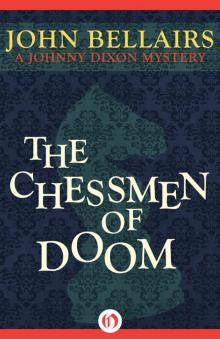 Chessmen of Doom
Chessmen of Doom Secret of the Underground Room
Secret of the Underground Room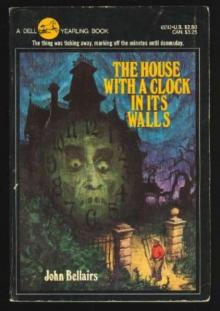 The House With a Clock in Its Walls
The House With a Clock in Its Walls The Vengeance of the Witch-Finder
The Vengeance of the Witch-Finder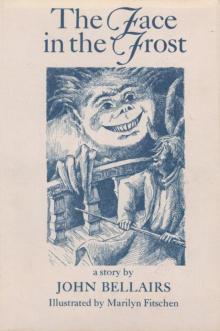 The Face in the Frost
The Face in the Frost Revenge of the Wizard's Ghost
Revenge of the Wizard's Ghost Spell of the Sorcerer's Skull
Spell of the Sorcerer's Skull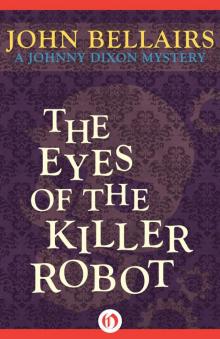 Eyes of the Killer Robot
Eyes of the Killer Robot Mummy, the Will, and the Crypt
Mummy, the Will, and the Crypt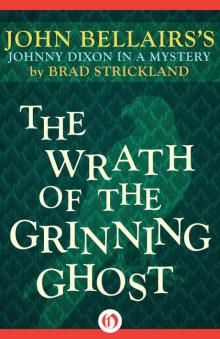 Wrath of the Grinning Ghost
Wrath of the Grinning Ghost The Mansion in the Mist
The Mansion in the Mist The Doom of the Haunted Opera
The Doom of the Haunted Opera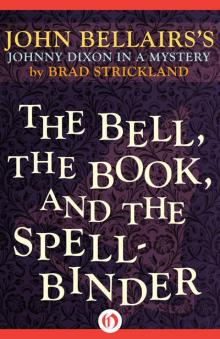 The Bell, the Book, and the Spellbinder
The Bell, the Book, and the Spellbinder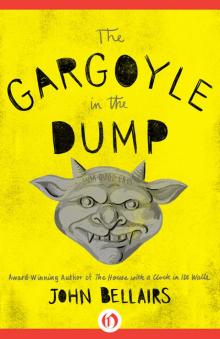 The Gargoyle in the Dump
The Gargoyle in the Dump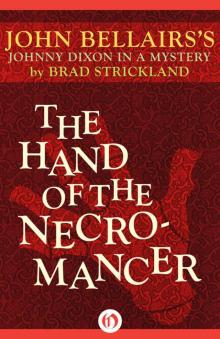 The Hand of the Necromancer
The Hand of the Necromancer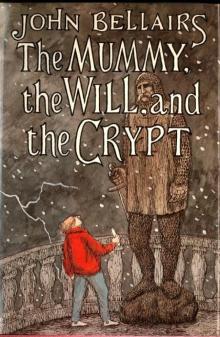 The Mummy, the Will, and the Crypt
The Mummy, the Will, and the Crypt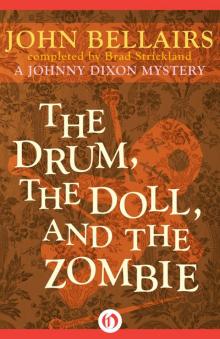 Drum, the Doll, and the Zombie
Drum, the Doll, and the Zombie The Specter from the Magician's Museum
The Specter from the Magician's Museum The Letter, the Witch, and the Ring
The Letter, the Witch, and the Ring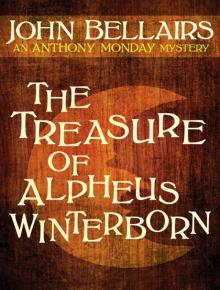 The Treasure of Alpheus Winterborn
The Treasure of Alpheus Winterborn The Dark Secret of Weatherend
The Dark Secret of Weatherend The Figure in the Shadows
The Figure in the Shadows